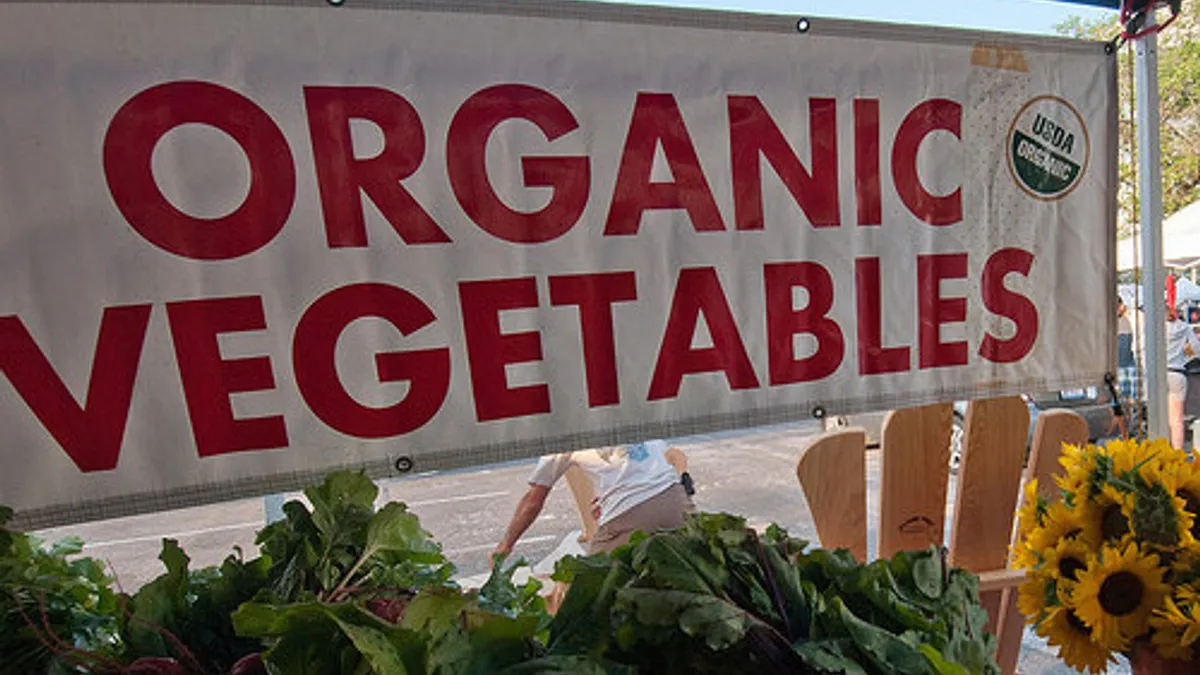Dive Brief:
- Organic food sales hit a record $50.1 billion in 2019, up 4.6% from the prior year, the Organic Trade Association said in a statement.
- The segment has seen demand pick up so far in 2020 as people stock up at home and look to eat healthier. Organic produce sales rose more than 20% in the spring of 2020, while other categories like organic milk, which until recently had been posting softer growth, have seen large spikes in demand.
- The OTA said all of the big staple categories — including dairy, eggs, bread, pasta, rice, grains and baking supplies such as flour and yeast — are expected to see increased growth in 2020, provided supply can keep up with demand.
Dive Insight:
Organic has been on an upswing for years with much of the category benefiting from a push by consumers to eat healthier. In 2019, organic food sales topped $50 billion for the first time.
The 4.6% increase in sales for the year outpaced the growth rate of around 2% for total food sales, the OTA said. While organic growth has moderated from annual increases averaging 10% between 2010 and 2016, an increase of nearly 5% is still substantial for a mature industry.
Now, the coronavirus pandemic appears to have stoked sales even more.
"Consumers were increasingly seeking out the organic label to feed their families the healthiest food possible," Laura Batcha, CEO and executive director of the Organic Trade Association, said in a statement. "The pandemic has only increased our desire for clean, healthy food.”
A study from the International Food Information Council released earlier this week found 85% of consumers said the coronavirus has changed their food habits, with more people responding that they were eating healthier than they usually do because of it. While it's uncertain how long the outbreak will last or the duration of its impact on food consumption, if more people pay closer attention to what they eat, it could bode well for the organic sector.
The OTA noted all major categories are expected to post a jump in 2020, including laggards like eggs and milk. Organic meat, poultry and fish was the smallest organic food category in 2019, with $1.4 billion in sales, but the segment also posted almost 10% growth, the highest of any category. With consumers concerned about the spread of the coronavirus at meat processing plants, as well as the likelihood that the coronavirus originated in animals, smaller scale organic producers could be ideally positioned to benefit.
Still, there is one bit of uncertainty that could temper some of the enthusiasm that organic could experience, which the OTA noted itself. The virus has cost tens of millions of U.S. workers their jobs, and with the continuing recession, the spending power of consumers could be squeezed even further. With tighter wallets, shoppers might be less inclined to pay a premium for organic products, instead turning to whatever they can afford to feed themselves and their families. It's uncertain if those people looking to pay more to eat healthier will be enough to offset individuals cutting back on their grocery bills.
“It’s hard to know what’s ahead of us, but consumers will continue to trust in and depend on the organic label,” Batcha said.














